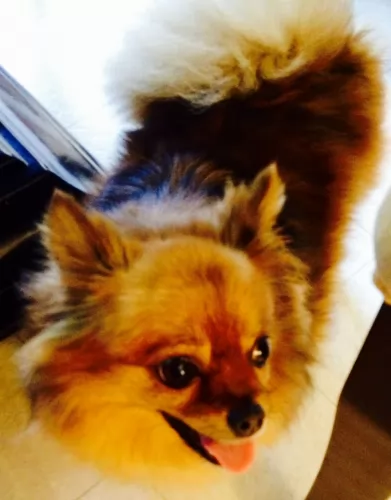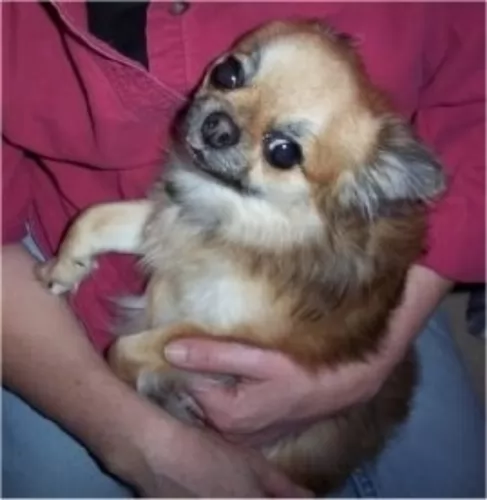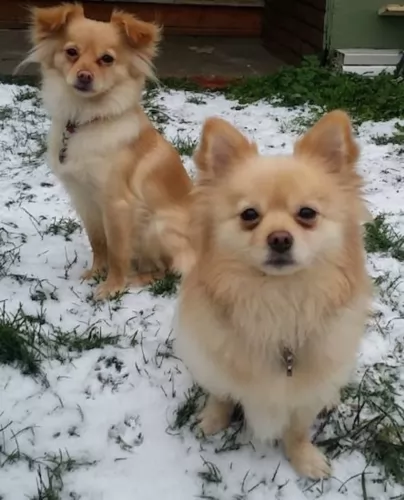 Petzlover
Petzlover Chiapom is originated from United States but Nova Scotia Duck-Tolling Retriever is originated from Canada. Chiapom may grow 29 cm / 11 inches shorter than Nova Scotia Duck-Tolling Retriever. Chiapom may weigh 15 kg / 33 pounds lesser than Nova Scotia Duck-Tolling Retriever. Chiapom may live 4 years more than Nova Scotia Duck-Tolling Retriever. Chiapom may have less litter size than Nova Scotia Duck-Tolling Retriever. Both Chiapom and Nova Scotia Duck-Tolling Retriever requires Moderate Maintenance.
Chiapom is originated from United States but Nova Scotia Duck-Tolling Retriever is originated from Canada. Chiapom may grow 29 cm / 11 inches shorter than Nova Scotia Duck-Tolling Retriever. Chiapom may weigh 15 kg / 33 pounds lesser than Nova Scotia Duck-Tolling Retriever. Chiapom may live 4 years more than Nova Scotia Duck-Tolling Retriever. Chiapom may have less litter size than Nova Scotia Duck-Tolling Retriever. Both Chiapom and Nova Scotia Duck-Tolling Retriever requires Moderate Maintenance.
 The Chi-Pom or Chiapom comes from mixing the Pomeranian and the Chihuahua, and both these dogs are toy breeds and known as companion dogs.
The Chi-Pom or Chiapom comes from mixing the Pomeranian and the Chihuahua, and both these dogs are toy breeds and known as companion dogs.
These little dogs each have their own individual histories, but but being a cross breed, the Chi-Pom’s history isn’t well documented particularly well.
Nobody seems to know precisely when this new dog breed came into being, but they were first bred in the United States.
 The Nova Scotia Duck Tolling Retriever dog was bred in the 19th-century in Nova Scotia, Eastern Canada.
The Nova Scotia Duck Tolling Retriever dog was bred in the 19th-century in Nova Scotia, Eastern Canada.
They were used as hunting dogs. Known as the ‘Toller’, the dog was at first referred to as the Little River Duck Dog but it was in 1945 that it became officially recognized by the Canadian Kennel Club as a pure breed.
The dog is a mix of retriever, setter, spaniel and possibly a farm collie mix breed. It was in 1980 that the breed gained national recognition, being declared the provincial dog of Nova Scotia in 1995.
 The Chi-Pom or Chiapom isn’t a pure bred dog, but a cross between the Chihuahua and the Pomeranian. This toy breed’s coat can be shortish like the Chihuahua or feathery and medium to long like with the Pomeranian, and the coat will be soft and shiny.
The Chi-Pom or Chiapom isn’t a pure bred dog, but a cross between the Chihuahua and the Pomeranian. This toy breed’s coat can be shortish like the Chihuahua or feathery and medium to long like with the Pomeranian, and the coat will be soft and shiny.
He has pointed ears, much like a fox, and the long tail is carried upward and curls over the back. The coat can be a solid color such as white, tan, cream, fawn, brown or gray, with the most common color being light brown.
If he takes more after the Pomeranian, he may need to have his hair cut. The typical Pomchi dog’s head is more round that the Pomeranian but with the narrow muzzle. The eyes are large and dark.
The Chiapom is a small dog that measures just 15 – 25cm in height and weighs between 2 and 8kg.
Pomchis are intelligent and inquisitive, having a temperament which comes from either of the two breeds which are quite similar.You’re definitely going to have an entertaining little dog, one who is energetic, curious and alert.
He isn’t a good choice with small children as he gets nervous and aggravated when handled improperly. Nervous and hurt, he may nip and then often he gets the blame, whereas he just shouldn’t have to put up with small children.
He loves to be in the company of his human family who treat him well, and he doesn’t like to be left alone. He is an intelligent little dog and is eager to learn. Therefore, even though he is small, training and socialization will be good for him and give him an even more amicable disposition.
 The Nova Scotia Duck Tolling Retriever is a medium-sized gundog. Both male and female stand at about 42 to 54cm in height and they weigh anything from 17 to 23kg.
The Nova Scotia Duck Tolling Retriever is a medium-sized gundog. Both male and female stand at about 42 to 54cm in height and they weigh anything from 17 to 23kg.
This beautiful dog is looked upon as the smallest of the retriever dogs. He has a remarkable medium-length, feathery red, copper or golden coat with some white markings and a long feathery tail with medium length, floppy ears. The coat will need brushing twice a week.
He is a powerful dog and also agile with a somewhat worried expression on his face. The expression becomes bright and animated when he is busy working and you’ll notice that the feathery tail is held high with confidence and delight when he is busy working or doing some activity he loves.
The Nova Scotia Duck Tolling Retriever is an intelligent, alert dog who is eager to please its owners.
They are affectionate dogs too, making a splendid family pet. If you’ve got kids in the home, you can trust this dog to get on well with them.
He is energetic, thriving on both physical and mental stimulation. He’ll love a walk every day as this will give him the chance to get out and sniff around. He won’t be content though with just a walk and will want ball games, walks in the park, hikes and swimming. This dog loves water and is well equipped for it with his double coat and webbed paws.
 Crossing two breeds of dog is the in-thing these days, and its not surprising that lovers of small breed dogs would think to mix the Chihuahua and the Pomeranian.
Crossing two breeds of dog is the in-thing these days, and its not surprising that lovers of small breed dogs would think to mix the Chihuahua and the Pomeranian.
The Chiapom is affectionate, playful and good-natured with their human family. They are full of personality, are spunky and brave, believing they can protect their families. He may be too frail for this but he alerts you to danger with his barking.
With the Chiapom, you’re going to have an awesome little friend who will stand by you in thick and thin.
 Your Toller is a high energy dog, and with the right family he is going to be an absolute joy to have. Give him lots of activities to stimulate him physically and mentally as he is an intelligent dog.
Your Toller is a high energy dog, and with the right family he is going to be an absolute joy to have. Give him lots of activities to stimulate him physically and mentally as he is an intelligent dog.
He is playful and social and full of life, although he is wary around strangers. Just like with most dogs, he will need training and socialization to round him off, making him obedient and well balanced.
With this good-natured pet, you will have a wonderful family friend and enthusiastic sport companion.
 Being a cross bred, the Chiapom will be healthier than the purebred Chihuahua or Pomeranian. He is full of personality, but sometimes he can have his fair share of doggy troubles too.
Being a cross bred, the Chiapom will be healthier than the purebred Chihuahua or Pomeranian. He is full of personality, but sometimes he can have his fair share of doggy troubles too.
He is more prone to injuries just because he gets under your feet all the time. We look at one or two health issues with this small breed that you should be aware of -
This is an ailment which can be found in all dogs but it occurs more in smaller dogs. An inflamed pancreas from trauma, infection or a metabolic disorder can mean your little dog vomiting, being uncomfortable with stomach pain and shivering.
This is a disease which involves the trachea which is also known as the windpipe. When the windpipe weakens, it becomes difficult to breath. Obesity in your pet as well as dust and kennel cough can contribute to this ailment.
 These dogs are robust, but certain genetic disorders do occur in the breed because of the smallish gene pool. Some of the biggest health problems they face are hip dysplasia and progressive retinal atrophy.
These dogs are robust, but certain genetic disorders do occur in the breed because of the smallish gene pool. Some of the biggest health problems they face are hip dysplasia and progressive retinal atrophy.
This eye disease is all about a group of degenerative eye disorders that cause blindness in both eyes of the dog.
The first symptom of this disease is night blindness where you see your dog being reluctant to go outside or to go up and down stairs in dim light. The surface of the eyes will get that cloudy, glazed-over look and as the disease progresses, you’ll find your pet bumping into things.
Mercifully it isn’t painful but you will need to get your pet to the vet to manage the condition.
 The Pomchi is a small dog who is looked upon essentially as an indoors dog, so it is quite able to adapt to apartment living as he won’t require large doses of exercise.
The Pomchi is a small dog who is looked upon essentially as an indoors dog, so it is quite able to adapt to apartment living as he won’t require large doses of exercise.
With some stimulating toys, he is able to exert energy indoors and will love to chase a ball down the passage. He certainly won’t do well in cold weather and being left outdoors.
The Chiapom often has the longer hair of the Pomeranian so it becomes necessary to give your little dog a good brush twice a week for the hair to remain tangle-free and to keep it shiny and silky.
You’ll notice with your Pomchi that he could possibly have overactive tear ducts so that they have a discharge. A small damp cloth can be used to wipe his eyes.
Small breed dogs often require more calories than larger dogs because of their higher metabolic rates. He is a small dog that will require all the right vitamins and minerals.
Commercial dog foods are certainly convenient, and the best quality ones contain the nutrients a dogs needs to remain health. It is always beneficial for your 4-legged friend if you can include some brown rice, a little bit of cooked chicken and vegetables in his diet. However, if you are uncertain about the nutrition requirements of your pet, speak to your vet and get help with a food that caters for your dog’s age, breed and activity levels.
 Tollers are energetic dogs and you won’t have to extend a second invitation to this dog to join you on your walks, hikes, hunting and swimming. It is perhaps why he is better suited to country living as opposed to living in the city.
Tollers are energetic dogs and you won’t have to extend a second invitation to this dog to join you on your walks, hikes, hunting and swimming. It is perhaps why he is better suited to country living as opposed to living in the city.
You want to ensure the best food for your four-legged friend, but the idea is to keep things simple and nutritious for your dog.
Your pet can’t tell you when he’s got a stomach-ache from eating the wrong foods so you have to be careful what you feed him. You want to make sure that the food you give your dog is balanced for the stage of life he or she is in – puppy, young adult, pregnancy, ill dog or senior dog.
You’ve also got to see whether your dog is small or large, active or a couch-potato type of dog, and choose commercially manufactured foods that cater for the kind of dog he is.
It is fine to feed your dog a kibble food or you can mix in some chopped up boiled chicken, brown rice or pasta and some vegetables such as carrots, sweet potatoes and spinach. Some raw meat added in when you can afford it, will also do your pet the world of good.
You can see from this diet, it is uncomplicated, plain, wholesome food and will do your pet good.
Always be careful of bones with your dog and speak to your vet first before you opt to give your dog bones.
Never leave your pet without a constant supply of fresh, cool water.
Both dogs and owners benefit when a dog has been trained and socialized. The dog is balanced and obedient and a stronger relationship develops between owner and dog because of the dog being well behaved. The Nova Scotia Duck-Tolling Retriever is an intelligent dog so he won’t have any trouble with training.